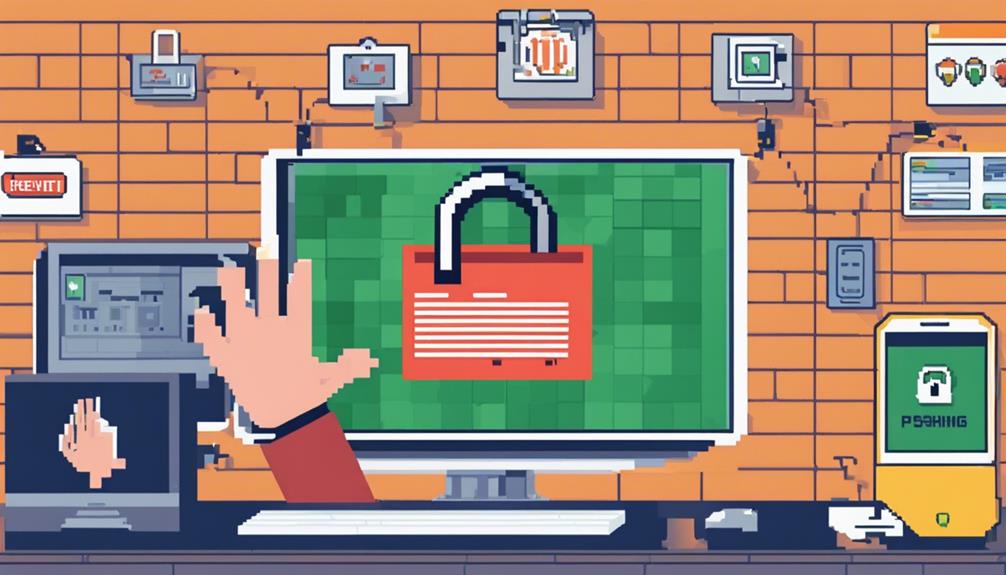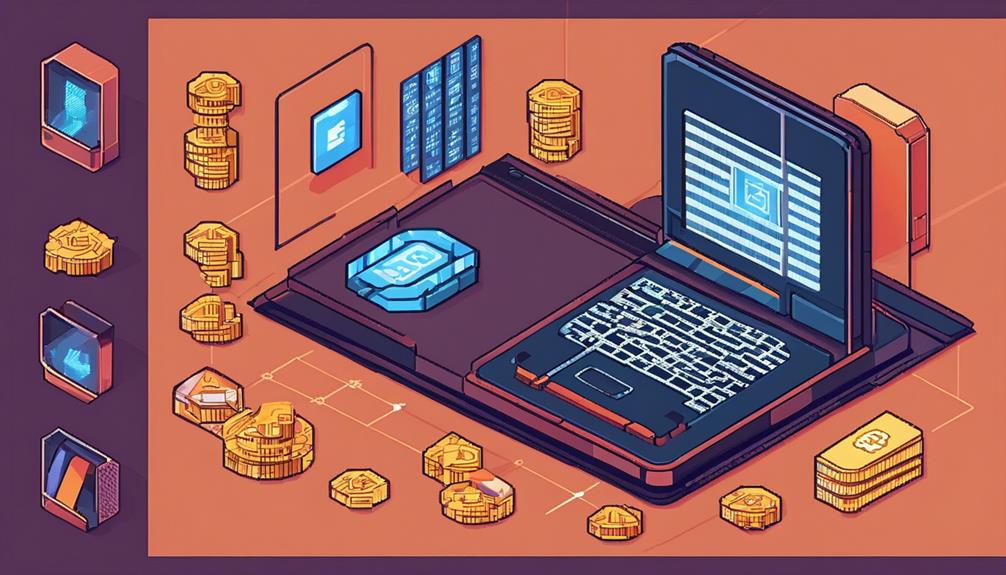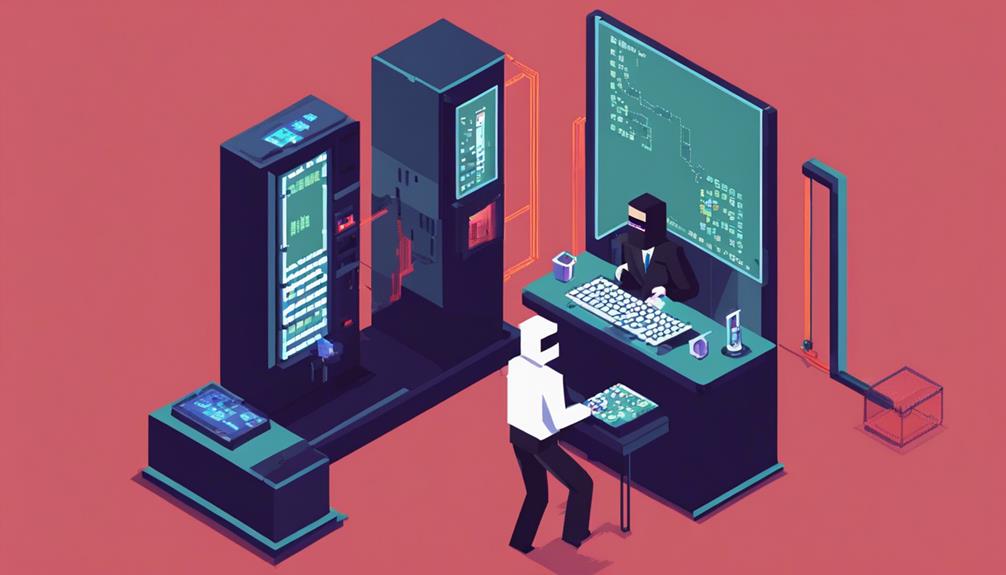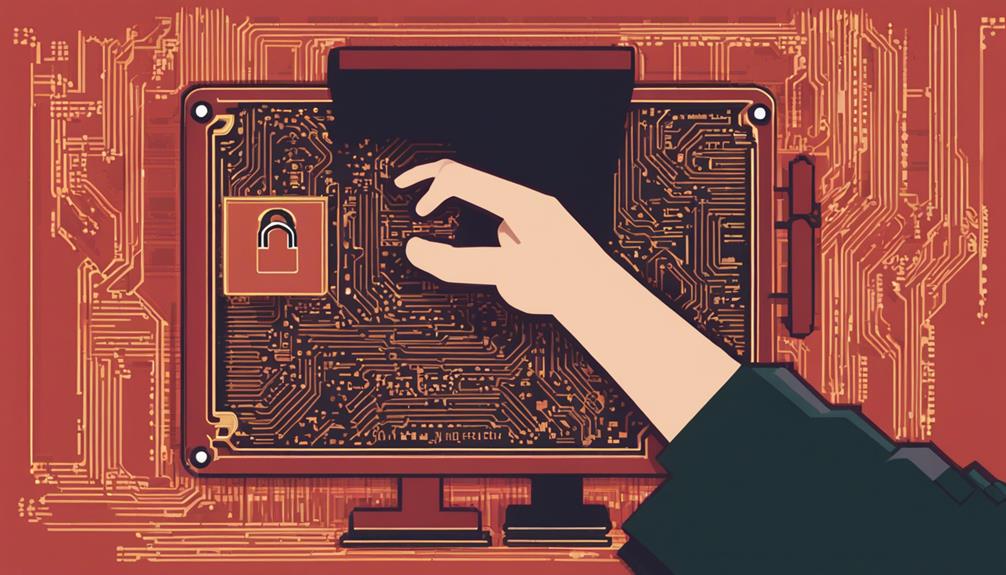Cryptocurrencies face hacking risks, with hackers targeting weak points like private keys and exchanges. Understanding blockchain security measures is essential for investors to protect their digital assets effectively. With over $1 billion lost in U.S. fraud incidents, safeguarding against hacks is paramount. Storing private keys securely, updating security measures regularly, and using two-factor authentication can enhance protection. Recent hacks, including the Poly Network incident involving $600 million, emphasize the necessity of robust security measures. Safeguarding crypto assets requires vigilance against cyber threats and utilizing secure storage methods.
Key Takeaways
- Encryption and consensus mechanics make altering a blockchain difficult for hackers.
- Safeguarding private keys and using secure wallets are crucial against hacking risks.
- Regular updates, two-factor authentication, and offline storage enhance asset protection.
- Recent hacks like the Poly Network breach highlight the importance of robust security measures.
- Hardware wallets with encryption provide added protection against cyber threats.
Blockchain Security Measures
Blockchain security measures play an indispensable role in safeguarding cryptocurrency transactions and preventing unauthorized access to the underlying decentralized ledger. The security of a blockchain is maintained through encryption, consensus mechanics, and the use of a public ledger that records all transactions.
Altering a blockchain is highly secure due to the requirement of controlling over 50% of the computational power. However, weaknesses outside the blockchain, such as private key storage, can be exploited by hackers, highlighting the necessity for robust security measures. Private key storage is a primary vulnerability, making wallets susceptible to hacks at the key storage level.
To guarantee the safety of cryptocurrency holdings, individuals must implement stringent security measures to protect their private keys and prevent unauthorized access to their digital assets. By understanding these security measures and vulnerabilities, investors can take proactive steps to safeguard their investments in the cryptocurrency space.
Common Cryptocurrency Hacking Risks

Cryptocurrency hacking risks encompass various threats, including wallet vulnerabilities, exchange breaches, phishing scams, and ransomware attacks. Hackers employ tactics like private key theft, social engineering, and malware to steal crypto, resulting in over $1 billion in fraud losses in the U.S. recently. The decentralized and irreversible nature of crypto transactions, coupled with limited regulatory oversight, complicates the recovery of stolen funds.
Protecting against hackers involves safeguarding private keys, utilizing secure wallets, and remaining vigilant against phishing attempts. Private keys, akin to passwords, grant access to crypto holdings and must be stored securely. Secure wallets, either hardware or software-based, provide added layers of protection.
Exchange breaches, where platforms are hacked, and phishing scams, involving deceptive emails or websites, are common avenues for cyber theft. Ransomware attacks, where malicious software encrypts data until a ransom is paid, also pose significant risks to cryptocurrency holders.
Understanding these risks is essential for investors to safeguard their digital assets effectively.
Protecting Your Crypto Assets

To enhance the security of your digital investments, implementing robust measures to protect your crypto assets is essential.
Safeguard your crypto assets by securely storing private keys and utilizing reliable wallets like hardware or cold wallets. It is vital to regularly update your security measures and exercise caution when sharing sensitive information online to shield your crypto assets from potential threats.
Enhance your account security by incorporating two-factor authentication (2FA) and consider transferring your crypto to offline storage when not actively trading.
Stay vigilant against common scams and phishing attempts that specifically target crypto holders, aiming to gain unauthorized access to your assets. By staying informed about the latest security best practices and remaining cautious of potential threats in the crypto space, you can effectively safeguard your investments against hackers.
Prioritizing the protection of your crypto assets through these security measures is essential for a secure and worry-free investment experience.
Recent Crypto Hacks and Impacts

The surge in crypto theft incidents in recent years has underscored the pressing need for heightened security measures within the digital asset space. Hackers have exploited vulnerabilities in various platforms, resulting in significant losses of cryptocurrency funds.
Some recent notable events include:
- Over $3.8 billion was stolen in cryptocurrency hacks and scams in 2021 alone.
- The Poly Network hack in 2021 saw $600 million in stolen funds returned by the hacker, showcasing the complexity of dealing with such incidents.
- Exchange hacks such as those on Bitfinex and Mt. Gox have exposed weaknesses in centralized platforms, highlighting the risks associated with keeping large amounts of cryptocurrency on these exchanges.
Moreover, DeFi platforms have not been immune, with the Cream Finance hack leading to a $25 million loss. Hackers often target smart contracts and decentralized finance protocols, emphasizing the importance of implementing robust security measures to safeguard against cryptocurrency theft.
Safeguarding Against Cyber Threats

Enhancing security measures against cyber threats is essential in safeguarding digital assets within the cryptocurrency space. Cryptocurrency wallets, where private keys for accessing digital currency are stored, are frequent targets for hackers seeking unauthorized access.
To mitigate these risks, investors can opt for hardware wallets like USB drives that use encryption to bolster security. Regularly transferring keys to new storage devices is another effective strategy to prevent unauthorized entry to valuable financial assets.
Understanding how private keys are stored and accessed is important in fortifying defenses against cyber threats. By utilizing hardware wallets with robust encryption mechanisms, investors can create an additional layer of protection for their digital currency holdings. This proactive approach reduces the vulnerability of wallets to malicious attacks by hackers.
Frequently Asked Questions
Is Crypto Safe What You Need to Know?
Cryptocurrency safety hinges on robust security measures like encryption and consensus mechanics. Investors must safeguard private keys and be wary of external vulnerabilities. Understanding wallet types and storage methods is essential to prevent crypto theft.
How to Invest in Cryptocurrency Safely?
Investing in cryptocurrency safely involves using reputable exchanges, implementing 2FA, and storing funds in cold wallets. Stay informed on security best practices, avoid phishing, and verify websites. Case in point, Binance's security measures protect user assets.
How to Safeguard Crypto?
To safeguard crypto, store private keys securely, utilize hardware wallets or cold storage, update security measures regularly, be vigilant of potential threats, and implement two-factor authentication. Avoid sharing sensitive information like private keys or seed phrases for enhanced security.
Is Crypto Safe From Hackers?
Crypto's security relies on blockchain technology and encryption methods, but vulnerabilities exist. Hackers often target weak points like wallets and exchanges. Safeguarding private keys is vital. Understanding secure storage options and using reputable wallets are essential.
Conclusion
To sum up, while blockchain technology offers robust security measures, cryptocurrency remains vulnerable to hacking risks. It is essential for investors to take proactive steps to protect their assets, such as using secure wallets and implementing strong authentication methods.
Despite the ongoing efforts to enhance security, the constant evolution of cyber threats poses a significant challenge to the safety of cryptocurrencies. By staying informed and vigilant, investors can better safeguard their investments in this ever-changing landscape.









